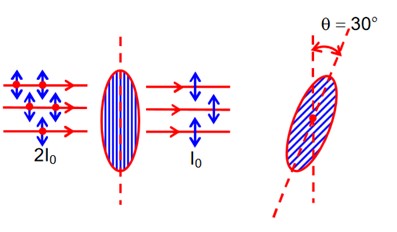In a Young's double slit experiment, the separation between the slits is . In the experiment, a source of light of wavelength is used and the interference pattern is observed on a screen kept away. The separation between the successive bright fringes on the screen is:
In a Young's double slit experiment, the separation between the slits is . In the experiment, a source of light of wavelength is used and the interference pattern is observed on a screen kept away. The separation between the successive bright fringes on the screen is:
The distance between two successive bright fringes is fringe width .
Similar Questions for you
The angle between the plane of vibration and plane of polarization is 90°.
At lower end
Tension, T? = 2g = 20 N (due to the 2 kg block)
Velocity, v? = √ (T? /μ) = √ (20/μ)
Wavelength, λ? = 6 cm
At upper end
Tension, T? = (2 kg + 6 kg)g = 8g = 80 N (due to the block and the rope)
Velocity, v? = √ (T? /μ) = √ (80/μ) = √4 * √ (20/μ) = 2v?
Since frequency (f) remains the same:
f = v?
β = λD / (d? + a? sinωt)
β? - β? = λD/ (d? - a? ) - λD/ (d? + a? )
= λD [ (d? + a? ) - (d? - a? ) / (d? ² - a? ²) ]
= 2λDa? / (d? ² - a? ²)
3d = 0.6mm
D = 80cm
= 800mm
Path difference is given by
BP – Andhra Pradesh = Dx
[for Dark fringe at P]
n = 0, for first dark fringe
first dark fringe is observed on the screen directly opposite to one of the slits]
Taking an Exam? Selecting a College?
Get authentic answers from experts, students and alumni that you won't find anywhere else.
On Shiksha, get access to
Learn more about...

Physics Wave Optics 2025
View Exam DetailsMost viewed information
SummaryDidn't find the answer you were looking for?
Search from Shiksha's 1 lakh+ Topics
Ask Current Students, Alumni & our Experts
Have a question related to your career & education?
See what others like you are asking & answering

